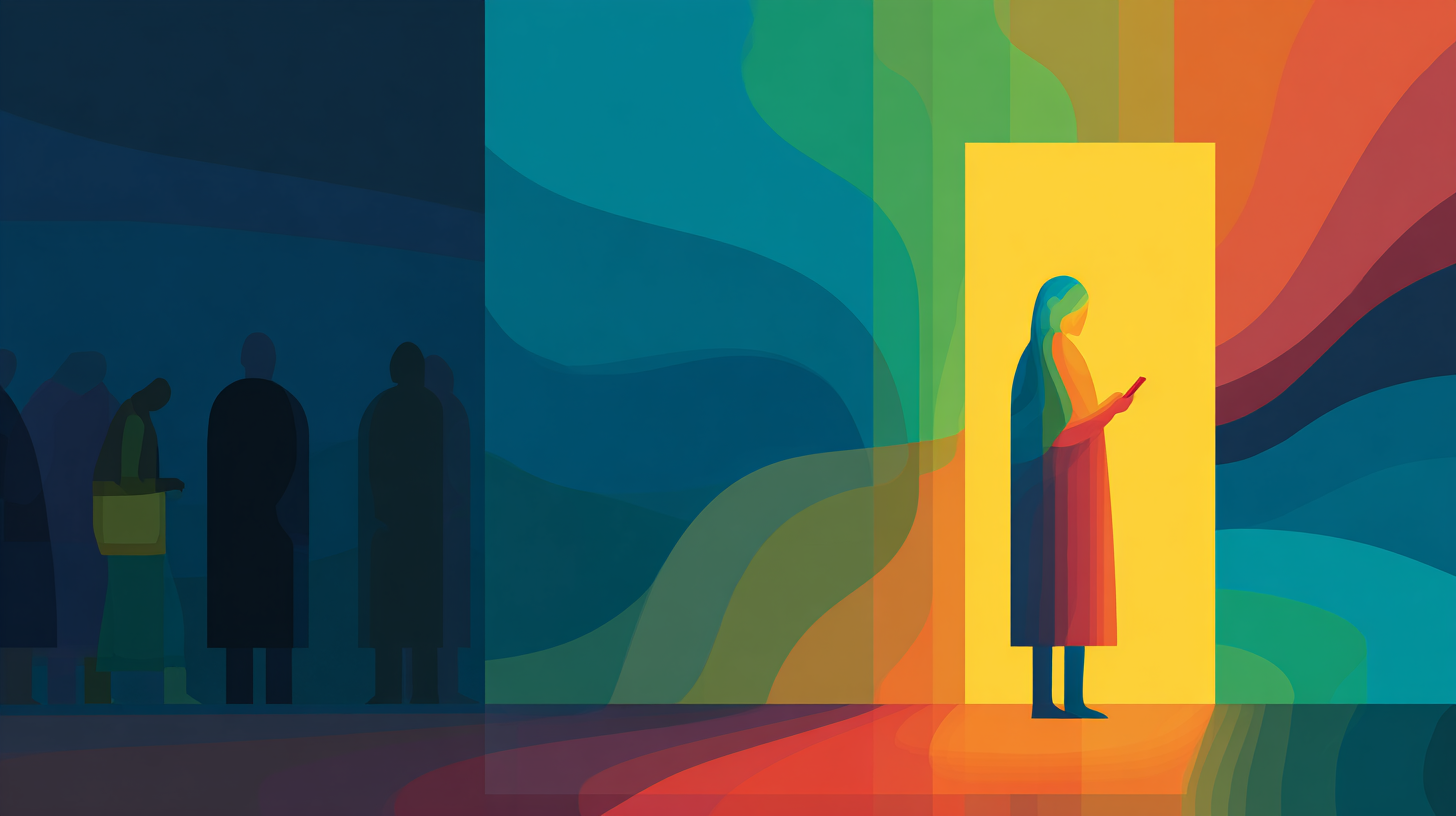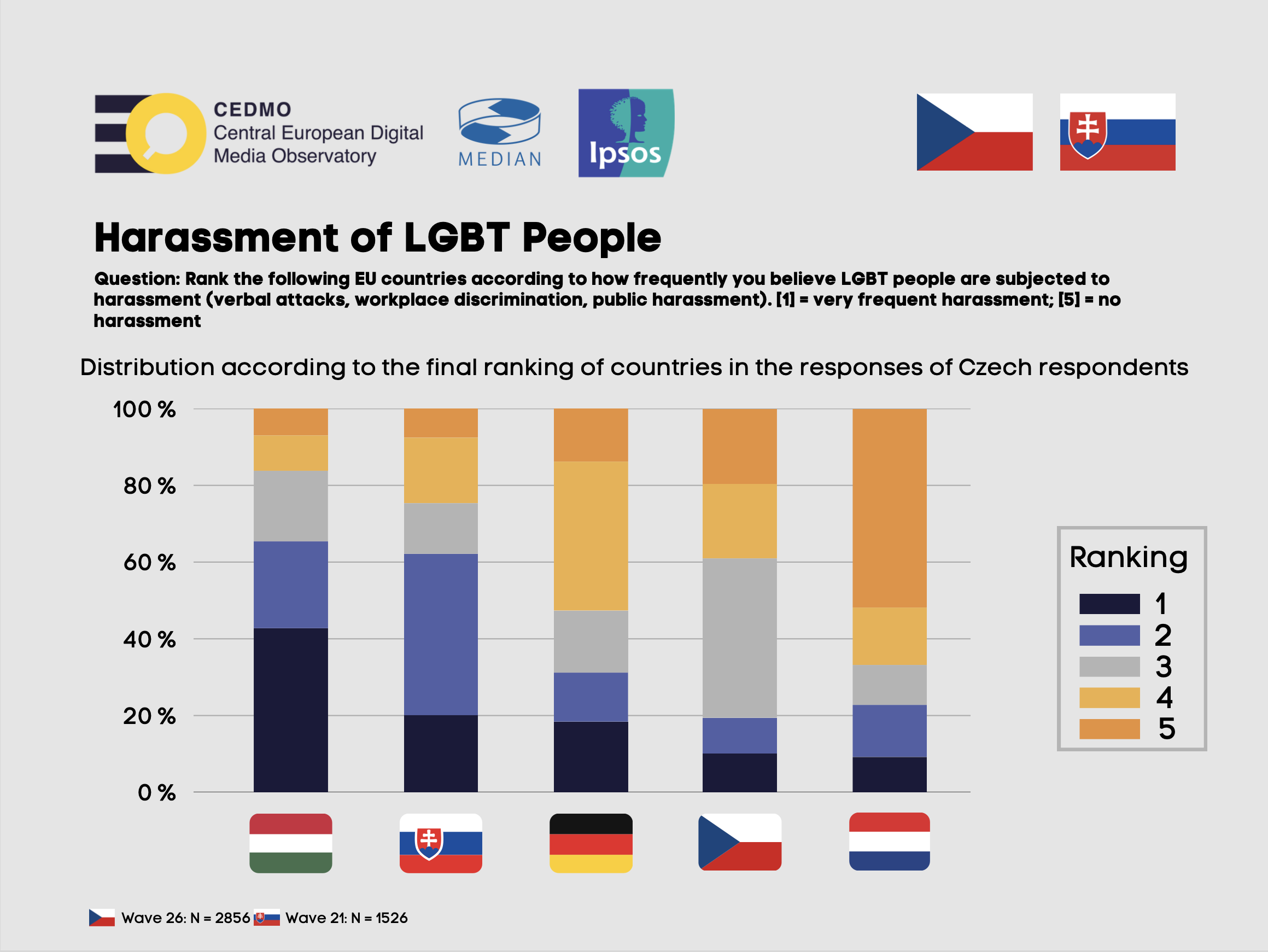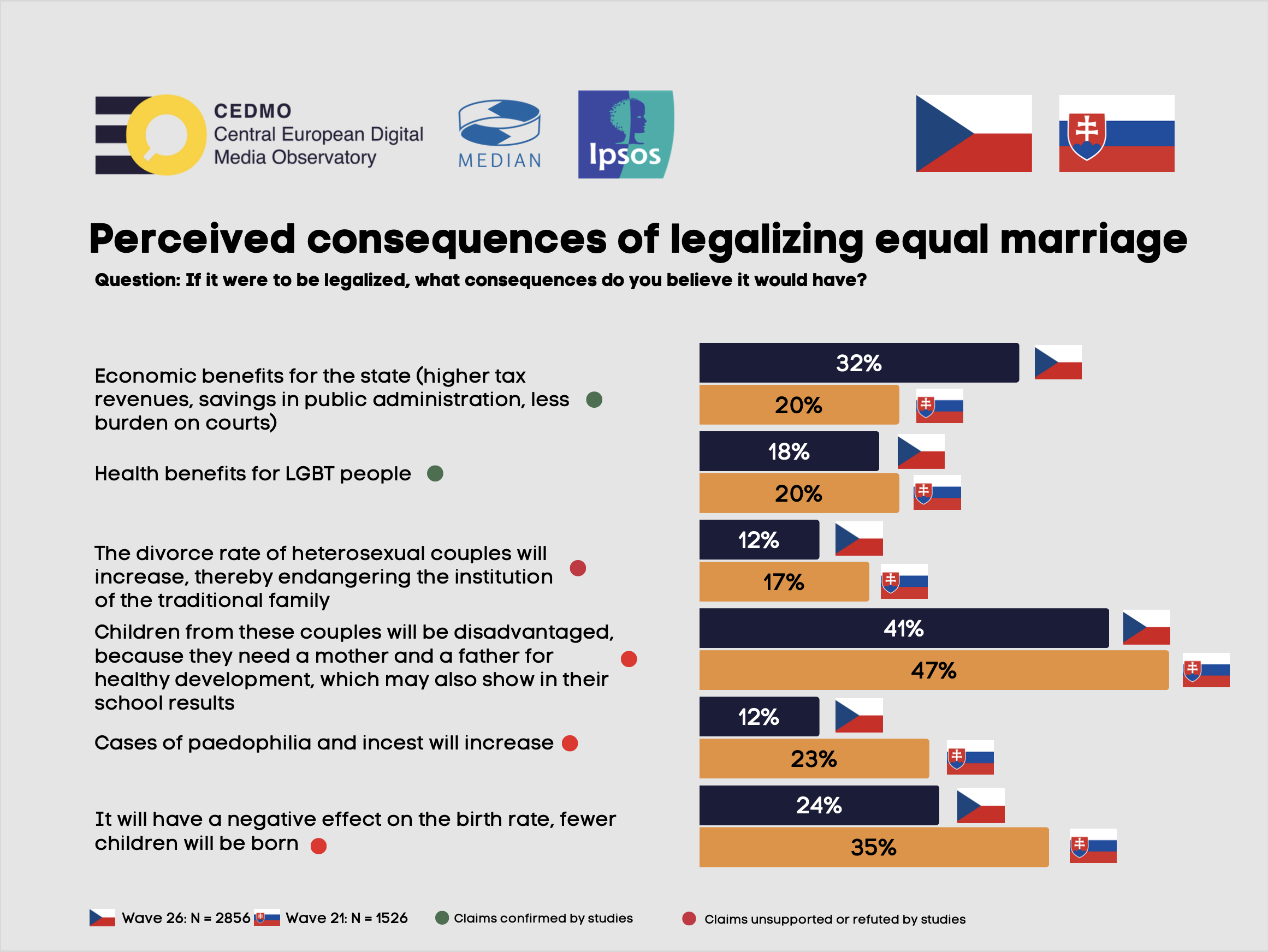
On November 20, the world commemorates Transgender Day of Remembrance. On this day, we are publishing the research results showing that although Czechs and Slovaks declare their openness towards LGBT+ people, they underestimate the extent of discrimination and believe myths – for example, about the disadvantages faced by children from rainbow families. The findings also confirm that personal contact with LGBT+ people significantly increases acceptance. The full report is available on our website.
Czechs underestimate the level of harassment of LGBT+ people
In the context of harassment of LGBT+ people, respondents to the CEDMO Trends Czechia survey ranked the country in the better half of the selected European countries. Only 10% of respondents identified Czechia as the country where LGBT+ people are most harassed. They believe that the situation is worse in Hungary (which 43% of respondents identified as a country where LGBT+ people are very often harassed), Slovakia (20%), and even Germany (18%). However, a comparison with the results of the European Union Agency for Fundamental Rights (FRA) international survey[1] shows that Czechs underestimate the reality. According to the FRA, Czechia is the country with the highest rate of harassment of LGBT+ people in the EU (63% of LGBT+ people report this experience, whether verbal or physical).
“The fact that respondents rate their country significantly more favorably indicates a tendency to self-stylize and underestimate domestic discrimination. This is a warning sign: Czech society is clearly unaware of the real conditions in which LGBT+ people live, and the idea of a ‘tolerant Czechia’ persists, obscuring reality,” comments CEDMO data analyst Lukáš Kutil on the findings.

Personal experience strengthens acceptance
Only 23% of Czech and 24% of Slovak respondents to the CEDMO Trends survey said they had openly LGBT+ colleagues in their workplace. This suggests that the work environment may still not be safe enough for many people.
Czechs who have LGBT+ colleagues show a record level of acceptance—91% (accept them or are happy to have them around). In contrast, only 49% of Czechs without direct experience declare acceptance. The effect is similar among Slovaks, albeit weaker.
“The impact of personal experience is undeniable: where there is direct interaction, prejudices disappear. While the Czech Republic generally shows slightly higher acceptance than Slovakia, the persistent power of disinformation narratives points to the need for greater awareness and destigmatization – especially in the area of the factual, but also economic, impacts of equality,” adds Professor Beáta Gavurová from the CEDMO research team at Charles University.
Myths about the mental health of LGBT+ people
CEDMO’s research has revealed fundamental differences in how the public perceives the causes of increased rates of mental illness and suicidal thoughts among LGBT+ people. These problems occur up to five times more often than among heterosexuals[2].
Respondents correctly identified some key factors, such as long-term exposure to discrimination and rejection by family[3]. However, there is little awareness of other, less visible causes, such as lack of legal protection[4] (reported by only 22% of Czechs and 25% of Slovaks) or internalized prejudice[5] (26% in both countries).
At the same time, it has been shown that Slovaks are significantly more prone to believing false and stigmatizing claims. For example, 30% of Slovaks consider the myth that LGBT+ people have an innate mental disorder to be true, compared to 14% of Czechs. Similar differences appear in the belief in the conspiracy narrative about “LGBT+ movement propaganda” (SR 24% vs. ČR 13%).
Distorted perception of children from rainbow families
Surveys have long shown[6] that the majority support for marriage for all prevails in the Czech Republic. Respondents most often base their position on personal conviction (50%) and understanding the whole issue as a matter of fundamental human rights (35%). Only a small percentage of Czechs (5%) say they base their opinion on scientific studies. Skeptics most often argue for the protection of traditional institutions (28%). Religious belief plays a minimal role in Czechia (6%), while in Slovakia its influence is more significant (16%).
The most common concern in both countries is the idea that children raised by same-sex couples will be disadvantaged because they allegedly need a mother and a father. This myth, repeatedly refuted by scientific studies[7], is considered true by 41% of Czechs and 47% of Slovaks.
On the contrary, the positive effects of legislative change are significantly underestimated. Only 32% of Czechs and 20% of Slovaks cite the economic benefits of legalizing marriage for all (such as higher tax revenues or savings in public administration) as a consequence.

[8]There is also a strong belief in disinformation narratives (especially in Slovakia). For example, the claim that marriage for all will increase the number of cases of pedophilia or incest is accepted by 23% of Slovaks compared to 12% of Czechs. Similarly, 35% of Slovaks and 24% of Czechs believe that legalization would have a negative impact on the birth rate.
The thematic report is available in the following versions:
- CEDMO Special Brief (data for Czechia and Slovakia) – in Czech
- CEDMO Special Brief (data for Czechia and Slovakia) – in Slovak
- CEDMO Special Brief (data for Czechia and Slovakia) – in English
Additional references
[1] https://fra.europa.eu/en/news/2024/harassment-and-violence-against-lgbtiq-people-rise
[2]https://www.nudz.cz/fileadmin/user_upload/Tiskove_zpravy/U_neheterosexualnich_lidi_(note: according to some studies, even more frequently: https://www.muni.cz/pro-media/tiskove-zpravy/vice-nez-tretina-lgbtq-lidi-v-ceske-republice-se-nachazi-ve-vysokem-riziku-depresivity-a-uzkostnosti)
[3] https://lgbt-zdravi.cz/studie-lgbtq-2022/, https://pubmed.ncbi.nlm.nih.gov/38511544/
[4] https://pubmed.ncbi.nlm.nih.gov/34448847/, https://pubmed.ncbi.nlm.nih.gov/38511544/
[5] https://link.springer.com/article/10.1007/s12144-024-06281-1
[6] https://cvvm.soc.cas.cz/images/articles/files/6157/ov250818.pdf
[7] https://www.researchgate.net/publication/232959498_A_Meta-Analysis_of_Developmental_Outcomes_for_Children_of_Same-Sex_and_Heterosexual_Parents, https://phys.org/news/2022-05-children-same-sex-parents-socially-well-adjusted.html, https://link.springer.com/article/10.1007/s11113-014-9329-6
[8] https://pmc.ncbi.nlm.nih.gov/articles/PMC3000058/, https://phys.org/news/2022-05-children-same-sex-parents-socially-well-adjusted.html
*CEDMO Trends offers unique insight into trends in media consumption among the population, focusing on specific types of information disorders such as misinformation and disinformation. These not only undermine public trust in institutions essential to the functioning of a pluralistic democracy, but can also amplify individual infodemics. For CEDMO (Central European Digital Media Observatory), the research agency Median conducts the survey in the Czech Republic on a representative sample of 2,700–3,000 respondents over the age of 16.
*The CEDMO TRENDS research in the Czech Republic is funded by the National Recovery Plan as part of project 1.4 CEDMO 1 – Z220312000000 Support for increasing the impact, innovation, and sustainability of CEDMO in the Czech Republic.
*In Slovakia, the research is conducted by IPSOS on a representative sample of 1,600–2,300 respondents aged 16 and over. Data collection in Slovakia was funded by the National Recovery Plan as part of the project entitled MPO 60273/24/21300/21000 CEDMO 2.0 NPO.
*The publication of the CEDMO Special Brief “Public Attitudes towards LGBT Issues” was financially supported by the National Recovery Plan, the EU Recovery and Resilience Facility program, as part of project 1.4 CEDMO 1 – Z220312000000, Support for increasing the impact, innovation, and sustainability of CEDMO in the Czech Republic.
